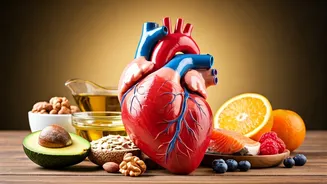Understanding HDL Cholesterol
High-density lipoprotein (HDL) cholesterol is often dubbed 'good cholesterol' because of its beneficial impact on cardiovascular health. It plays a crucial
role in eliminating excess cholesterol from your arteries and transporting it to the liver, where it is processed and removed from the body. Maintaining healthy levels of HDL cholesterol can significantly lower the risk of heart disease, strokes, and other cardiovascular ailments. When individuals adopt a diet rich in foods that support HDL production, they create a defensive measure against the build-up of plaque in the arteries, thereby facilitating better blood flow and a reduced risk of cardiac complications.
Olive Oil's Benefits
Olive oil, particularly extra virgin olive oil, is a staple of the Mediterranean diet and is renowned for its heart-healthy properties. It's abundant in monounsaturated fats and antioxidants, both of which are linked to increased HDL levels. Including olive oil in your daily diet offers more than just a culinary enhancement; it actively contributes to cardiovascular wellness. Using olive oil for cooking, drizzling it over salads, or consuming it directly helps support the body's natural processes of eliminating cholesterol and protecting against oxidative stress within the arterial walls. This, in turn, decreases the chances of developing blockages that could lead to serious cardiac issues.
Avocados for HDL
Avocados are a powerhouse of nutrients and healthy fats, particularly monounsaturated fats, that help boost HDL cholesterol. Regular consumption of avocados contributes to better overall heart health because they contain compounds that fight inflammation and boost HDL production, helping to clear harmful cholesterol from the arteries. Whether enjoyed in guacamole, sliced on toast, or added to salads, avocados provide a simple and delicious way to bolster your heart health. Integrating avocados into your diet can lead to improved cholesterol profiles and a lowered risk of heart disease, ensuring a more robust cardiovascular system.
Fatty Fish Advantage
Fatty fish, such as salmon, mackerel, and sardines, are rich sources of omega-3 fatty acids. These essential fats not only increase HDL cholesterol levels but also reduce triglycerides, which are another type of fat linked to heart disease. The omega-3s found in these fish also reduce inflammation throughout the body, contributing to overall health and lessening the burden on the cardiovascular system. Integrating fatty fish into your diet at least twice a week can yield substantial benefits. The beneficial fats in these fish contribute to the removal of harmful cholesterol and enhance artery function, supporting overall cardiovascular vitality.
Nuts and Seeds Power
Nuts and seeds, including almonds, walnuts, and flaxseeds, are beneficial additions to a heart-healthy diet. They are packed with healthy fats, fiber, and plant sterols. These nutrients assist in raising HDL cholesterol levels while simultaneously lowering LDL (bad) cholesterol levels. Consuming a handful of nuts and seeds daily can provide a quick and efficient means of improving your cholesterol profile. The plant sterols in these foods compete with cholesterol absorption, thereby helping to reduce cholesterol buildup. This combination supports a healthy heart by preventing plaque formation within arteries, leading to better blood flow.
Whole Grains for Health
Whole grains, like oats, quinoa, and brown rice, are fiber-rich foods that boost HDL cholesterol levels. They are also associated with reduced LDL cholesterol levels, contributing to a balanced lipid profile. The fiber in whole grains helps to bind cholesterol in the digestive system, preventing its absorption into the bloodstream. Selecting whole grains over refined grains allows you to incorporate more of this heart-healthy fiber into your diet effortlessly. Switching to whole-grain options in your meals can improve cholesterol levels and help maintain a robust cardiovascular system.
Beans and Legumes
Beans and legumes, which include lentils, chickpeas, and kidney beans, provide an excellent source of fiber and plant-based protein. They help to improve HDL cholesterol levels, while also aiding in the reduction of LDL cholesterol. The soluble fiber present in beans helps in the absorption of cholesterol. These foods are also low in saturated fat, making them an excellent option for those looking to improve their heart health. Eating beans and legumes a few times per week provides a valuable way to support your cardiovascular health, reduce cholesterol, and foster a healthy, balanced diet.
Dark Chocolate's Role
Dark chocolate, consumed in moderation, can offer a treat with heart-healthy benefits. It contains antioxidants called flavonoids, which have been linked to increased HDL cholesterol levels and enhanced vascular function. Eating dark chocolate regularly can help prevent the oxidation of LDL cholesterol, which is a key factor in the development of plaque in the arteries. Opting for dark chocolate with a higher cocoa content (70% or higher) maximizes the antioxidant benefits, contributing to improved cholesterol profiles and a healthy heart. However, it’s important to enjoy this treat mindfully, as it's still calorie-dense.














